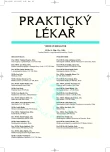The legacy of I. F. Semmelweis; key milestones in the development of hospital hygiene and current challenges.
Odkaz I. F. Semmelweise dnešku, klíčové etapy vývoje a nejzávažnější současné problémy nemocniční hygieny
Již v roce 1847 Ignaz Fülöp Semmelweis vyžadoval od personálu porodnice, na které pracoval, aby si mezi vyšetřeními jednotlivých pacientek, obzvláště při přechodu od vyšetřování mrtvých těl k rodičkám, umyli ruce. Za 160 let uplynulých od té doby se mnohé změnilo. Nelze však v uvedeném kontextu nevzpomenout několik rozhodujících milníků na cestě k dnešní praxi v prevenci nemocničních nákaz (NN) i současných problémů nemocniční hygieny.
Semmelweis zahájil praxi mytí rukou u lékařů před a po vyšetření každého pacienta. Později nastoupilo používání ochranných rukavic a dalších prostředků (ochranný oděv) v případech, kdy mohlo dojít ke kontaktu s tělesnými tekutinami či tkáněmi. Došlo k rozvoji používání antiseptik a sterilizaci nástrojů používaných v chirurgických procedurách a nakonec v dnešní době jsme dospěli po uplynutí „zlatých časů“ antibiotik do éry hledání šancí, jak účinně čelit nezadržitelně rostoucím problémům s NN způsobenůch původně nemocničními (a dnes již mezi komunitní kmeny pronikajícími) ke značné časti spektra antibiotik rezistentními bakteriálními kmeny.
Klíčová slova:
vývoj nemocniční hygieny, I. F. Semmelweis, F. Nightingalová, L. Pasteur, J. Lister, R. Koch, antibiotická rezistence, nemocniční nákaza, MRSA, komunitní MRSA, nemocniční hygiena, antibiotické středisko, kvalita života.
Authors:
V. Bencko
Authors‘ workplace:
Přednosta: prof. MUDr. Vladimír Bencko, DrSc.
; Ústav hygieny a epidemiologie 1. LF UK a VFN Praha
Published in:
Prakt. Lék. 2007; 87(2): 68-72
Category:
Editorial
Overview
It was in 1847 that Ignaz F. Semmelweis first ordered his staff at the First Maternity Clinic in Vienna, Austria, to wash their hands in a chlorinated lime solution before examining patients, most particularly after examining dead patients before prenatal examinations, at delivery or post partum.
A lot has changed in the 160 years since then. Several milestones should be noted with regards to these developments, connected with names such Florence Nightingale, Louis Pasteur, Joseph Lister and Robert Koch.
Semmelweis later extended his demands to the use of protective gloves and other clothing where contact with body fluids or tissues was expected. Developments have been made in the use of antiseptics and instrument sterilization in invasive procedures. It is presumed that the problems of hygiene standards in hospitals of the 19th century are behind us – unfortunately this is not absolutely true.
The “golden age” of antibiotics has given way to an era that has witnessed a rapid increase in antibiotic resistance following the appearance of so called “super bugs” that are resistant to a wide spectrum of antibiotics. This has meant that a recent problem that currently drastically compromises hospital hygiene is connected with hospital acquired infections caused by methicillin resistant Staphylococcus aureus (MRSA). This is particularly dangerous in hospitals because MRSA poses a high risk to immunocompromised patients. The situation is complicated by the penetration of community associated MRSA strains into the hospital environment and vice versa. We are now facing a great challenge to arrest this growing threat.
Key words:
development of hospital hygiene, I. F. Semmelweis, F. Nightingale, L. Pasteur, J. Lister, R. Koch, antibiotic resistance, hospital infection, MRSA, community MRSA, antibiotic centre, quality of life.
Labels
General practitioner for children and adolescents General practitioner for adultsArticle was published in
General Practitioner

2007 Issue 2
- Memantine Eases Daily Life for Patients and Caregivers
- Possibilities of Using Metamizole in the Treatment of Acute Primary Headaches
- Metamizole at a Glance and in Practice – Effective Non-Opioid Analgesic for All Ages
- Memantine in Dementia Therapy – Current Findings and Possible Future Applications
- Metamizole vs. Tramadol in Postoperative Analgesia
-
All articles in this issue
- The legacy of I. F. Semmelweis; key milestones in the development of hospital hygiene and current challenges.
- Insulin pump therapy for diabetic patients
- Three hundreds pancreas transplantations in the Institute of Clinical and Experimental Medicine in Prague
- Symptomatic diabetic neuropathy: irreversible nerve damage?
- Catheter ablation for atrial fibrillation in 2007
- Diabetic foot syndrome
- Risk of malnutrition and nutritional support in Alzheimer disease
- How well do patients follow their doctor’s advice?
- A manual for the „Our class does not smoke“ programme
- Two cases of aortic valve endocarditis after the floods in 2002
- Symptoms of paraneoplastic encephalopathy as the first clinical sign of Hodgkin’s lymphoma. A case study
- Active search for prostate cancer by PSA testing in GP surgery
- General Practitioner
- Journal archive
- Current issue
- About the journal
Most read in this issue
- Risk of malnutrition and nutritional support in Alzheimer disease
- Active search for prostate cancer by PSA testing in GP surgery
- The legacy of I. F. Semmelweis; key milestones in the development of hospital hygiene and current challenges.
- Symptomatic diabetic neuropathy: irreversible nerve damage?
